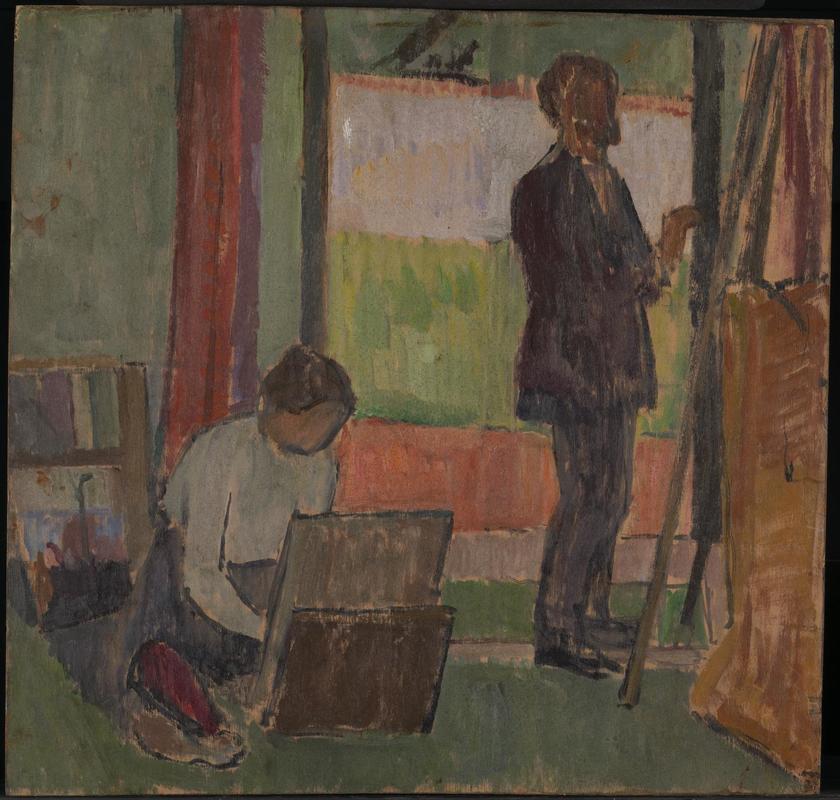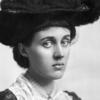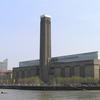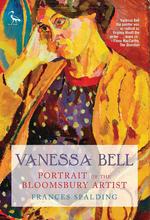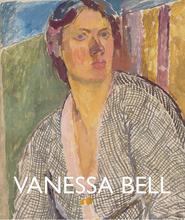More about Frederick and Jessie Etchells Painting
- All
- Info
- Shop

Contributor
Vanessa Bell is the first UK abstract artist, and Frederick and Jessie Etchells Painting shows the changes in her work in relation to her boundary-pushing friends, the Bloomsbury Group.
The Tate, the owner of Frederick and Jessie Etchells Painting, for example, introduces abstraction beginning with a Kandinsky from just two years before Frederick and Jessie Etchells Painting. While Bell's abstraction depicts life, it connects visually with works which have no real-world content.
The same year as Frederick and Jessie Etchells Painting, Frederick was among the guests at the wedding of Bell's sister, the pre-eminent novelist Virginia Woolf, but Woolf does not remember seeing him. Maybe she was thinking about her writing, or maybe he was just the shoe gazing type.
The writer Whitney Chadwick tells the story of Frederick and Jessie Etchells Painting in terms of the timeless writing of Virginia Woolf, as when she declared that the future of fiction depends on to "what extent men can be educated to stand free speech in women." Although Woolf's probably-deliberate passive voice ("can be educated") is ambiguous or ambivalent, we can infer that she is saying that women, ignoring stereotypes of "politeness," passivity, etc., must be the ones to educate men to stand women's free speech. In other words, men are not, despite all appearances, self-governing, but instead are completely unable to function in any way without women telling us how to interact in a more conscious way, even if we spend all of our time listening to other men instead of women.
Maybe this is all projection and exaggeration, but, in any case, Woolf's apparently double-whammy obligation for both men and women explains, in part, why Bell was not a fan of her male model in Frederick and Jessie Etchells Painting: Frederick stands at the easel, allowing his sister to sit, following the dogma that "modern" art is a man's game. To counter this assumption, Bell formed the Friday Club, which included the Etchells siblings.
Woolf wrote, for the Memoir Club, in 1922, about a certain moment marking the possibility of women's free speech, four years before Frederick and Jessie Etchells Painting, when Lytton Strachey asked if a stain on Vanessa Bell's white dress was semen. Woolf says that this moment was liberating for the whole coed crew. Even more, she writes, "a flood of the sacred fluid seemed to overwhelm us." After serious consideration, I'm almost beginning to think that there's nothing anyone can add to that sentence, without writing a book about it. They were some real seminal Renaissance women, working in textiles, cover illustration, oils, prose, letters, public speaking, furniture design, and other areas.
Sources
- "Abstract Art." Tate, https://www.tate.org.uk/art/art-terms/a/abstract-art.
- Chadwick, Whitney. Significant Others: Creativity & Intimate Partnership. London: Thames & Hudson, 2018.
- Cork, Richard. Art Beyond the Gallery in Early 20th Century England. New Haven, CT: Yale University Press, 1985.
- Eich, Cinzia. "Vanessa Bell." VCU Modern Influences on Contemporary Art, http://www.people.vcu.edu/~djbromle/modern-art/index.htm.
- Palmer, Alan Warwick, and Veronica Palmer. Who's Who in Bloomsbury. Sussex: Harvester Press, 1987.
- Quinn, Bridget. Broad Strokes: 15 Women Who Made Art and Made History (in That Order). San Francisco: Chronicle Books, 2017.
- Reed, Christopher. Bloomsbury Rooms: Modernism, Subculture, and Domesticity. New York: Bard Graduate Center for Studies in the Decorative Arts, Design, and Culture, 2004.

